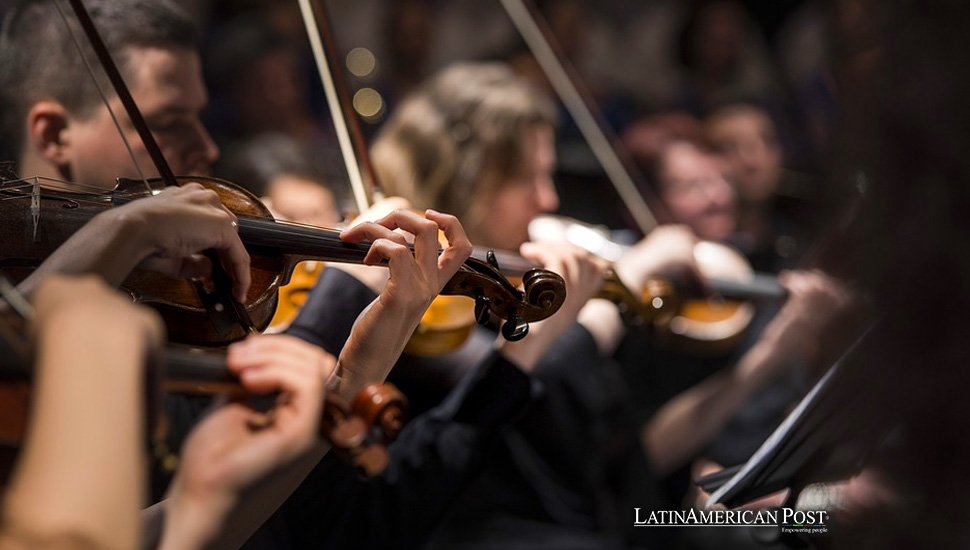Two Mexicans, a Cuban, and a Peruvian in the Top 100 of Living Classical Music Composer

In a striking shift, contemporary classical music has doubled its presence in global auditoriums, with Latin American composers leading the charge and challenging traditional norms in the industry.
Transformative Decade for Classical Music
Classical music has witnessed a transformative surge in contemporary compositions in the last decade, with Latin American artists prominently featured among the top 100 most programmed composers in 2023. Mexican composers Gabriela Ortiz and Arturo Márquez, Cuban Tania León, and Peruvian Jimmy López Bellido are breaking new ground in a genre increasingly appealing to younger, more diverse audiences.
This shift is evident in the programming choices of concert halls worldwide. In 2013, contemporary classical music constituted a mere 6% of the music program. By 2023, this figure has risen to 14%, indicating a significant shift in audience preferences and industry practices.
Breaking the “Pale, Male, and Stale” Norm
The paradigm of the “pale, male, and stale” composer is no longer the norm. This change reflects a broader desire within the classical music community to engage with younger audiences and embrace a more inclusive and varied repertoire. As editors at the British website Bachtrack noted, the evolution in programming is a response to a more significant societal push for diversity in terms of gender, nationality, and race within the arts.
Despite these changes, the sector remains heavily dominated by the likes of Mozart, Beethoven, Bach, Brahms, and Schubert. However, contemporary composers are gradually making their mark. Benet Casablancas of Spain, sharing the 69th spot with López Bellido, is an example of this new wave of influential composers.
Importance of Audience Familiarity
In a conversation with EFE, Casablancas emphasized the importance of familiarizing with today’s musical creations. He believes that as audiences lose their apprehension and open themselves to new experiences, this will lead to broader public appeal across generations and social strata.
An essential factor in promoting novel compositions is the role of residencies. These programs provide artists with conducive environments for creation and dissemination. Commissions of new works are also critical in introducing audiences to “new worlds” of music.
Joan Matabosch, the artistic director of the Teatro Real de Madrid, asserts that theater and concert hall programmers play a vital role in this transformation. He stresses that theaters must actively open to new aesthetics and composers to facilitate this change.
Historical Transformation and Controversy
Historically, even the most classical operas were once new and often controversial. Matabosch cites Verdi’s ‘Rigoletto’ as an example, initially received as an “outright assault on the decency of the institution” at La Fenice in Venice in 1851.
Bachtrack’s analysis of 31,309 concerts, operas, and dance performances reveals that the push for gender equality is also reshaping the landscape. In 2023, 22 of the top 200 composers of all periods were women, a significant increase from just two in 2013. Among the top 100 living composers, 36 were women in 2023, up from eleven in 2013.
The presence of women composers is increasingly prominent, with Sofia Gubaidulina, Caroline Shaw, Unsuk Chin, and Anna Clyne among the top 10, while Kaija Saariaho (who passed away in mid-2023), Jesse Montgomery, and Anna Thorvaldsdottir are close behind in the top 20. This starkly contrasts with 2013, when no women were among the top 20.
Furthermore, female conductors are also gaining prominence. In 2023, 11% of concerts were led by female conductors, with Elim Chan being the most engaged conductor in concert halls, ranking 25th. The top 100 included thirteen other women, a substantial increase from a decade ago when only four were listed.
Also read: Carlos Vives Headlines 50th Folklore Festival in Uruguay
Despite these advancements, only seven out of 102 orchestras with included events had women in principal conductor or music director positions. Lucía Marín, who debuts this opera season at Bilbao’s ABAO, becoming the first Spanish woman and the third woman to do so in its 70-year history, notes that the world of classical music remains somewhat insular. Yet, she acknowledges a growing trend to make classical music more accessible to the public by introducing new works that revitalize programming.
The classical music scene is experiencing a renaissance, with a growing acceptance and appreciation for contemporary compositions and increased representation of diverse voices. This evolution reflects a global movement towards inclusivity and innovation, ensuring the genre’s relevance and appeal to new generations of music lovers. As these trends continue, the classical music landscape is poised to become more prosperous, more varied, and more reflective of the world it seeks to entertain and inspire.




